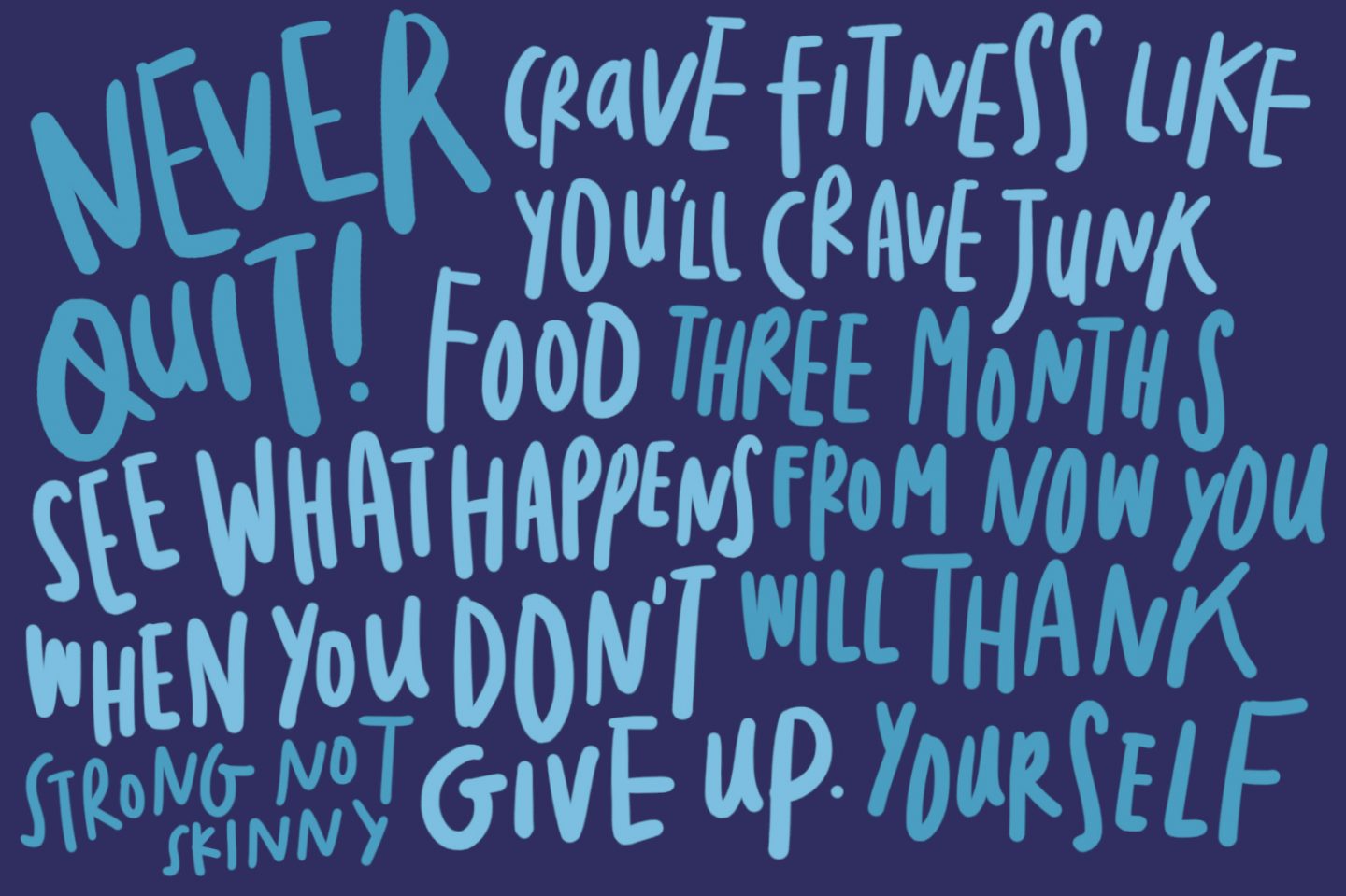Fitness, once culturally confined to small communities of professional strength sports, bodybuilding, track and field, is now accessible to the white-collar worker, housewife and kid next door. Everyone wants to drink from the fountain of youth, performance, glamour and bragging rights.
But the broth is tainted.
As with most fads, commercialisation and “influencer” culture brings out the worst of the fitness “industry”. Dishonesty, objectification and sexualisation run rampant for the sake of quick sales and “likes”. In this game, lighting, angles, posing and photo editing software can go a long way.
Too many are obsessed with their image. Too many harm their health through drug abuse and eating disorders. Too many blindly slurp from these toxic waters.
For anyone with a desire to care for their bodies, those are clear wrongs. But let’s talk about the grey areas. There are good things in the mix, but it isn’t immediately clear if #fitspo culture – that’s short for fitness inspiration – lines up with our call to discipleship.
The positive: A certain level of health, nutrition and fitness should be the responsibility of every believer because we are instructed to honour God with our bodies.
You can’t go around healing the sick if you’re the one always sick. Bodily woes cascade into mind and spirit. Walking with God wouldn’t be easy if you’re limping breathless.
If you want to be useful for God you must steward your health (1 Corinthians 9:27), and exercise is a big part of it. Quality of life, longevity, increased capacity for good work – that’s all good.
And it doesn’t end with us. Some youth workers get at-risk youths into the gym to liberate (or distract) them from former vices. Some Crossfit gyms take CSR very seriously (Some boxes are even started by churches). There’s sports outreach, and now you can even raise money for charity by working out.
Is your temple more preoccupied with burning fat than incense? When you exercise, are you merely worshipping thy golden calves?
Expressing and honing our physical movement with the right heart can be our act of worship (Romans 12:1), regardless of whether it comes naturally or through a structured fitness regime. Be the best living sacrifice you can be.
But as endurance athletes and Giant Pandas could testify, it’s possible to get drunk with good stuff. Behold the snare of addiction. The boundary between health and obsession quickly blurs.
What is a suitable level of fitness? A healthy one, even?
For serious players, training can last several hours and be extremely exhausting. Nutrition, equipment and memberships can burn holes through pockets. It’s not uncommon for people to skip Sunday worship because they went too hard the day before.
(I’m guilty as charged. My runs also function as personal prayer/worship time, but who am I kidding?)
Jesus-following Fitspos live with an inner tension because while fitness is of some benefit (1 Timothy 4:8) and could be directed “for God’s glory” (Matthew 13:12), it’s often self-serving.
Vanity.
One can’t help but wonder how a championship-winning physique could ever “glorify” God more than a dad-bod. Insta-famous “fitness” ladies often post post-workout butt selfies with a caption: “Your body is a temple.” This is a misdirected witness.
Is your temple more preoccupied with burning fat than incense? When you exercise, are you merely worshipping thy golden calves? Temples – no matter how shabby, flabby or skinny-fat – should intentionally, passionately and reverently host the presence of God.
Every Christian must be convicted that our current existence is inevitably tied to futility, vanity and meaninglessness. Everything is vanity.
But by grace, our actions can be redeemed.
The Preacher in Ecclesiastes wasn’t calling for readers to completely give up activities that are transient – or we’d end up literally doing nothing in this life. Rather, he commends the sober realisation that God is the only worthwhile pursuit.
The duty of man, therefore, is to remember that all is from Him, through Him and to Him (Romans 11:36), doing everything for His glory (1 Corinthians 6:20). Only in Him do we live, move and have our being (Acts 17:28).
Or as Jimmy Peña, author, exercise physiologist and founder of PrayFit Ministries put it: “Grace removes the burden of trying to perfect a body that won’t last and yet grace is the reason to honour God with it every day that it does.”
So we must be be aware of the fine line between simply doing things claiming it’s “for God” and doing what He actually wants us to do. After all, great evils have been committed in His Name.
In an age where sportspersons, celebrities and politicians so readily trace the sign of the cross or kiss the ground on bended knee, just about anything can be done “for God’s glory”. But we can only speculate if they’re really being obedient stewards to God, or using God as an excuse for self-glorification.
In one of the Bible’s most tragic narratives, King Saul disobeyed God’s direct instruction to completely destroy Amalek. Though he reasoned that the best oxen, calves and lambs were for sacrifice, God called him out through Samuel:
“For rebellion is as the sin of divination,
and presumption is as iniquity and idolatry.
Because you have rejected the word of the Lord,
he has also rejected you from being king.” (1 Samuel 15:23)
Does your ego swell with praises and complements from others? Are you unable to really, truly direct it back to God (Proverbs 16:18-20)? Has ability or aesthetics replaced God as your measure of worth or identity (Romans 8:15-16)? Are your prayers more comparison- or communion-focused?
The danger of passion is that it can easily spin into idolatry and pride. Watch and pray, because the slip into self-obsession is subtle and gradual (Matthew 26:41).
The key here is to invite God into your fitness goals and training. As His child, your duty is to bring Him glory on His terms.
Our lifestyle should enable or enhance our witness for Jesus (Matthew 28:18-20). Strict adhesion to dietary plans or twice-a-day training sessions should not prevent us from loving, serving and communing with others in and out of the Body.
Our lifestyle should enable or enhance our witness for Jesus.
Jesus warns us to identify false prophets by their fruit (Matthew 7:15): The good stuff is love, joy, peace, patience, kindness, goodness, faithfulness, gentleness and self-control (Galatians 5:22-23). In our endeavours, are we inspiring others to the right fruits?
If you’re uncertain where your heart really lies, it’s time to ask yourself the hard questions. And when the sweat is wiped clean, will you live to lift another day?









